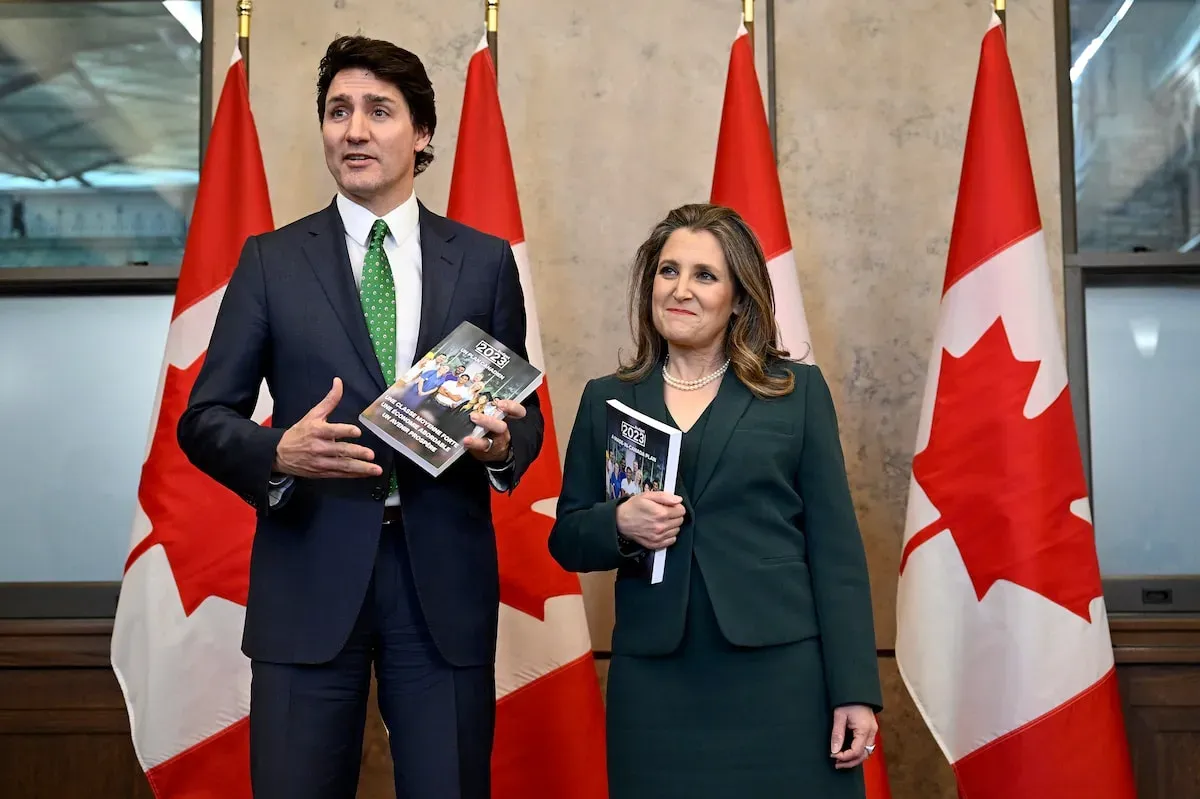Freeland tariffs response has become a pivotal topic as the Liberal leadership race heats up, especially with Chrystia Freeland at the forefront. In reaction to the looming U.S. tariffs on Canada, Freeland has boldly proposed a 100 percent tariff on American imports such as wine, beer, and notably, Tesla vehicles. This strategy aims to directly challenge the trade threats Canada faces under Donald Trump, targeting key allies of the U.S. president, including Elon Musk. With Trump expected to announce significant tariffs against Canada and Mexico soon, the pressure is mounting for a decisive Canadian response. As discussions around tariffs escalate, many are left wondering how these trade dynamics will impact our economy and international relations.
The ongoing debate surrounding tariffs imposed by the U.S. has sparked considerable interest in Canada, particularly with Chrystia Freeland stepping up to address these challenges. As the potential implementation of hefty tariffs looms, there is a growing focus on how Canada can strategically navigate these trade disputes. Freeland’s proposal to levy tariffs on products such as Tesla vehicles highlights the urgency of counteracting the trade threats posed by the current U.S. administration. With Trump’s anticipated announcement of tariffs, the dialogue around Canada’s economic defense strategies has never been more critical. Understanding these trade tensions is essential for grasping the broader implications on both bilateral relations and domestic markets.
Chrystia Freeland’s Strategy Against U.S. Tariffs
In the face of escalating trade tensions, Chrystia Freeland, a prominent candidate in the Liberal leadership race, is formulating a robust response to the U.S. tariffs on Canada. Freeland has highlighted the necessity of a reciprocal approach, suggesting a 100 percent tariff on U.S. products such as wine, beer, and notably, Tesla vehicles. This strategy is not just a retaliatory measure; it aims to leverage economic pressure on key figures in the Trump administration and their allies, specifically targeting influential businesses tied to these tariffs.
Freeland’s approach signifies a calculated effort to assert Canada’s position in ongoing trade discussions. By proposing tariffs on American goods that resonate with Trump’s base, she hopes to create a ripple effect that could pressure the U.S. government to reconsider its aggressive trade stance against Canada. This strategy is particularly relevant as Trump is expected to announce a significant 25 percent tariff on Canadian imports, a move that could have substantial implications for Canadian industries.
The Impact of Tesla Vehicle Tariffs on Canada
The proposed tariffs on Tesla vehicles represent a pivotal point in the conversation about the trade relationship between Canada and the U.S. Freeland’s assertion that Canada should impose tariffs on Tesla is particularly intriguing, considering the automaker’s significant market presence in North America. By focusing on a high-profile brand like Tesla, Freeland aims to draw attention not only to the economic implications but also to the potential backlash from consumers and investors who are loyal to Musk’s vision.
The impact of these tariffs could extend beyond immediate financial repercussions. For Tesla, already facing challenges from rising production costs, the addition of tariffs could lead to higher prices for Canadian consumers, altering demand dynamics in the electric vehicle market. Furthermore, the trade threats Canada faces from the U.S., particularly those linked to the automotive sector, underscore the complex interplay of economics and politics in this ongoing trade saga.
Navigating Trade Threats from the Trump Administration
As the Trump administration continues to issue trade threats towards Canada, the need for a strategic response becomes increasingly urgent. Freeland’s leadership in addressing these threats reflects a broader understanding of the interconnectedness of trade relations. With Trump’s anticipated 25 percent tariffs looming, Canada must navigate a treacherous landscape that could impact not just the economy, but also diplomatic relations between the two nations.
The potential for retaliatory measures, such as the proposed tariffs on U.S. wine and beer, showcases Canada’s readiness to defend its interests. However, the effectiveness of these measures will depend on how well Canada can coordinate its response and rally support from other nations affected by U.S. tariffs. Freeland’s proactive stance may serve to unify Canadian businesses and consumers against what many perceive as unfair trade practices.
Economic Implications of Trade Tariffs on Canada
The economic implications of the proposed tariffs are profound, especially for key sectors in Canada. Industries such as lumber and oil, which are significant contributors to the Canadian economy, could face challenges if tariffs are imposed on their exports to the U.S. Freeland’s call for retaliatory tariffs is a bold move that aims to protect these sectors while also sending a message to the Trump administration about the potential fallout of their trade policies.
Moreover, the uncertainty surrounding the tariffs can lead to volatility in the market, affecting investment decisions and consumer behavior. Canadian businesses might hesitate to expand or invest in new projects due to the unpredictability of trade relations. As Freeland navigates these complexities, the focus will remain on how to mitigate economic risks while advocating for a fairer trade framework with the U.S.
Freeland’s Tariffs Response: A Call to Action
Freeland’s proposed tariffs on U.S. products are not merely a reaction; they represent a strategic call to action for Canada to assert its economic sovereignty. By targeting products that have cultural and economic significance, such as wine and Tesla vehicles, she is attempting to galvanize public support and rally Canadian businesses to stand against U.S. tariffs. This response is crucial as it not only addresses the immediate concerns but also sets the stage for a more robust negotiation strategy moving forward.
The effectiveness of Freeland’s tariffs response will hinge on public perception and international support. If Canadians rally behind this initiative, it could strengthen the government’s position in future negotiations, showcasing a united front against external economic pressures. This could also lead to increased pressure on the Trump administration to reconsider its tactics, especially as the repercussions of trade wars become increasingly evident.
Potential Repercussions of Trade Wars on Canadian Consumers
Trade wars inevitably trickle down to consumers, and the proposed tariffs on U.S. products could lead to increased prices for everyday items. Freeland’s tariffs response could result in higher costs for imported goods, affecting how Canadians shop and what they choose to buy. This shift in consumer behavior could further impact Canadian businesses that rely on competitive pricing to attract customers.
Moreover, as companies like Tesla adjust their pricing strategies in response to tariffs, Canadian consumers might find themselves facing a narrower selection of options or paying a premium for certain products. This could lead to a broader discussion about the importance of supporting local industries and finding alternative solutions that minimize dependency on U.S. imports, particularly in the automotive sector.
Freeland and the Future of Trade Relations with the U.S.
Freeland’s actions and responses to the U.S. tariffs are not only pivotal for the current political climate but also for the future of trade relations between Canada and the U.S. Her leadership style emphasizes negotiation, resilience, and strategic retaliation, which will be crucial as the situation evolves. The ongoing tensions underscore the need for a clear and coherent trade policy that can adapt to changing circumstances while protecting Canadian interests.
As the Liberal leadership race progresses, Freeland’s approach to U.S. tariffs will likely be a defining issue. Her ability to navigate these challenges could either bolster her position as a leader or complicate her campaign if the economic repercussions are severe. Ultimately, her response to trade threats will shape not only her political future but also the economic landscape of Canada in the years to come.
Public Opinion on Tariffs and Trade Policies
Public opinion surrounding tariffs and trade policies is a critical factor in shaping the discourse on Canada’s response to U.S. trade threats. Freeland’s stance on implementing tariffs has garnered mixed reactions, with some Canadians supporting a tough approach while others express concern over potential economic fallout. Understanding these sentiments is essential for Freeland as she navigates her leadership campaign and seeks to unify diverse viewpoints within the electorate.
Moreover, public perception can significantly influence government policy. If Canadians perceive tariffs as a necessary measure to protect their economy, there may be greater support for Freeland’s initiatives. Conversely, if the perceived costs outweigh the benefits, it could lead to pushback against her strategies. This dynamic highlights the importance of effective communication and engagement with the public as Freeland lays out her vision for Canada’s trade future.
The Role of Canadian Industries in Trade Negotiations
Canadian industries play a pivotal role in shaping trade negotiations, especially in the context of the ongoing tariffs imposed by the U.S. Freeland’s proposals for retaliatory tariffs on U.S. goods are closely tied to the interests of various sectors, including automotive, agriculture, and technology. Engaging these industries in the negotiation process is crucial for developing a comprehensive strategy that addresses both immediate concerns and long-term trade objectives.
By fostering collaboration between government and industry leaders, Freeland can create a unified approach to tackling U.S. tariffs. This collaborative effort could lead to innovative solutions and alternative strategies that not only protect Canadian interests but also position Canada as a formidable player in North American trade relations. As the landscape continues to shift, the synergy between government initiatives and industry perspectives will be key to achieving sustainable trade outcomes.
Frequently Asked Questions
What is Chrystia Freeland’s response to U.S. tariffs on Canada?
Chrystia Freeland has proposed a strong response to U.S. tariffs on Canada, advocating for a 100 percent tariff on U.S. products, including wine, beer, alcohol, and Tesla vehicles. She believes that targeting Trump’s allies, like Elon Musk, could effectively counter the trade threats Canada faces.
How are Tesla vehicles affected by the proposed tariffs from Canada?
Under Chrystia Freeland’s proposed tariffs in response to U.S. tariffs on Canada, Tesla vehicles could face a 100 percent tariff, significantly impacting their pricing and market presence in Canada. This move aims to put pressure on Tesla and its CEO, Elon Musk.
What trade threats is Canada facing from the U.S. under Donald Trump?
Canada is facing trade threats from Donald Trump, who is expected to announce 25 percent tariffs on Canadian goods, effective March 1st. In response, Chrystia Freeland is suggesting retaliatory tariffs, including on Tesla vehicles, to protect Canadian interests.
How might Canada retaliate against U.S. tariffs on Canadian exports?
In response to U.S. tariffs, Chrystia Freeland has mentioned the possibility of imposing tariffs on Canadian exports such as lumber and oil. This strategy aims to counteract the impact of U.S. tariffs on Canada and target Trump’s close allies.
What impact could Chrystia Freeland’s tariffs on U.S. products have?
Chrystia Freeland’s proposed tariffs on U.S. products, including Tesla vehicles, aim to retaliate against U.S. tariffs on Canada. This could lead to increased prices for these goods in Canada and potentially strain trade relations between the two countries.
What is the significance of targeting Tesla in Canada’s tariff response?
Targeting Tesla in Canada’s tariff response is significant as it aims to pressure Elon Musk and highlight the impact of U.S. tariffs on Canadian consumers. Chrystia Freeland believes that by hitting Trump’s allies, Canada can assert its stance against unfair trade practices.
What are the expected consequences of the trade threats Canada faces?
The trade threats Canada faces, particularly from the proposed U.S. tariffs, could lead to higher prices for consumers and disrupted trade. Chrystia Freeland’s response, including potential tariffs on Tesla, seeks to mitigate these effects and protect Canadian economic interests.
How does Chrystia Freeland plan to confront the upcoming tariffs?
Chrystia Freeland plans to confront the upcoming tariffs by proposing retaliatory measures, including a 100 percent tariff on U.S. products like Tesla vehicles. Her strategy focuses on directly challenging Trump’s trade policies and protecting Canadian industries.
| Key Point | Details |
|---|---|
| Freeland’s Leadership Race | Chrystia Freeland is a leading candidate in the Liberal leadership race. |
| Proposed Tariffs on U.S. Products | Freeland suggested a 100% tariff on U.S. wine, beer, alcohol, and Tesla vehicles. |
| Targeting Trump’s Close Allies | The strategy aims to pressure Trump’s allies, particularly Elon Musk of Tesla. |
| Anticipated U.S. Tariffs | Trump is expected to announce a 25% tariff against Canada and Mexico. |
| Speculation on Canadian Response | Canada is considering tariffs on its lumber and oil exports to the U.S. |
| Impact on Tesla | Tesla announced price hikes on vehicles due to impending tariffs. |
Summary
Freeland tariffs response is crucial as the Liberal leadership race heats up, with Chrystia Freeland proposing significant tariffs against U.S. products to counteract Donald Trump’s trade threats. By targeting high-profile entities like Tesla, Freeland aims to leverage economic pressure in negotiations, particularly as Trump prepares to impose his own tariffs. The unfolding situation highlights the complexities of trade relations and Canada’s strategic decisions in retaliation, which may include targeting key exports. As both sides navigate these tensions, the economic implications for Canadian businesses and consumers remain significant.








